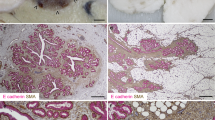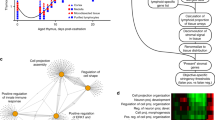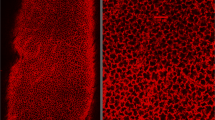Abstract
THE recent communication by Törő and Oláh1 on nuclear blebs in the thymus of post-natal guinea pigs has prompted this report of similar observations on foetal human thymus glands. Small blocks of the thymus glands of hysterotomy foetuses measuring 55 mm, 76 mm, 140 mm, and 210 mm from crown to rump were fixed in Dalton's solution and prepared for electron microscopy. The material was sectioned with glass knives, and the sections mounted on 200-mesh New type copper grids, double stained with uranyl acetate and lead citrate, and examined under an electron microscope.
This is a preview of subscription content, access via your institution
Access options
Subscribe to this journal
Receive 51 print issues and online access
$199.00 per year
only $3.90 per issue
Buy this article
- Purchase on Springer Link
- Instant access to full article PDF
Prices may be subject to local taxes which are calculated during checkout
Similar content being viewed by others
References
Törő, I., and Oláh, I., Nature, 212, 315 (1966).
Weakley, B. Sh., Patt, D. I., and Shepro, D., J. Morphol., 115, 319 (1965).
Izard, J., and Broussy, J., Bull. Assoc. Anat. Forty-ninth Reunion, 870 (Madrid, 1964).
Izard, J., J. Exp. Cell Res., 37, 487 (1964).
Author information
Authors and Affiliations
Rights and permissions
About this article
Cite this article
SEBUWUFU, P. Nuclear Blebs in the Human Foetal Thymus. Nature 212, 1382–1383 (1966). https://doi.org/10.1038/2121382a0
Received:
Issue Date:
DOI: https://doi.org/10.1038/2121382a0
This article is cited by
-
Grease in the Nucleus: Insights into the Dynamic Life of Nuclear Membranes
The Journal of Membrane Biology (2023)
-
Nuclear envelope-limited chromatin sheets (ELCS) and heterochromatin higher order structure
Chromosoma (2009)
-
Chromatin organization within nuclear blebs in leukocytes ofXenopus laevis
Experientia (1980)
-
Cytochalasin B-induced changes in concanavalin A-activated lymphocytes
Cell and Tissue Research (1978)
-
Nuclear Pockets and Projections in Fish Melanoma
Nature (1970)
Comments
By submitting a comment you agree to abide by our Terms and Community Guidelines. If you find something abusive or that does not comply with our terms or guidelines please flag it as inappropriate.



